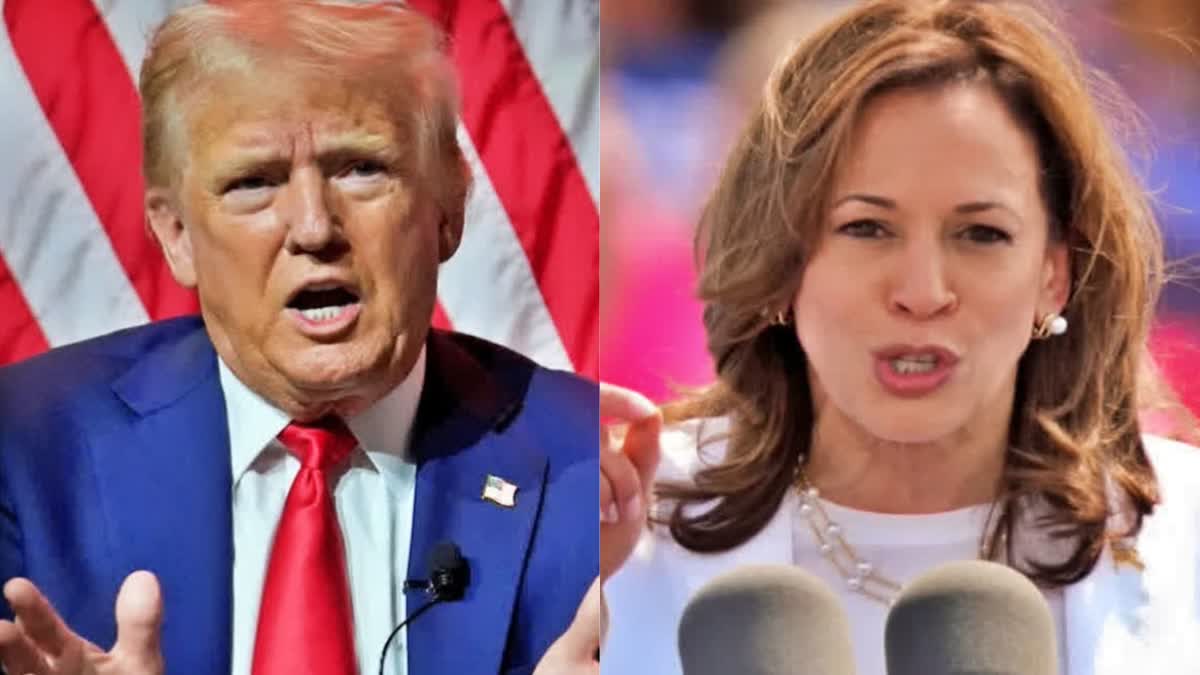New Delhi: As voting day approaches for this year’s US presidential election pitting Vice President Kamala Harris against former President Donald Trump, there are speculations about what the outcome will mean for India.
With Democrat Harris having Indian heritage – her mother was of Indian-origin - her candidacy has generated considerable attention within India, adding a layer of personal connection for many Indians watching the election unfold. At the same time, Republican candidate Trump has been describing Prime Minister Narendra Modi as a good friend, vowed to boost ties with India and pledged to protect the interests of Hindu Americans.
However, while Trump’s administration is again hyping up the ‘Make America Great Again’ agenda that had earlier included tariffs impacting Indian goods, Harris’s approach, under President Joe Biden’s administration, has leaned towards multilateral cooperation and strengthening alliances, including with India. It is in light of this that Indian policymakers and business leaders will be closely monitoring both candidates’ stances on these issues, eager to understand the future direction of bilateral ties.
So, from whose victory will India stand to gain? Harris’s or Trump’s?
“What animates and propels India-US relations is a combination of geostrategic expediencies and exigencies on the one hand and great potential for collaboration in science and technology on the other,” veteran Indian-origin journalist and author Mayank Chhaya, who closely follows American politics, told ETV Bharat over phone from Chicago.
“Geostrategic expediencies and exigencies flow from the dramatic rise of China in the last nearly four decades to a stage now where it is clearly the only well-rounded global nemesis to the United States,” Chhaya said. “As long as Washington perceives Beijing as its global nemesis - and the prospects of that remaining the case for the next two decades and more are distinct - no US administration would risk diluting its relations with India in the foreseeable future.”
He explained that Washington sees India with its generally robust democracy, strong economy and the sheer demographic potential as the most effective counterbalance both within the Indo-Pacific and around the world. Also the fact that two nations share an intrinsic respect for democratic ideals is a powerful binding force.
“With that as the backdrop, I do not see any significant directional change in India-US relations whether Vice President Kamala Harris wins or former President Donald Trump does,” he stated.
According to Chhaya, if Harris wins, “she would add a sheen to the relations given her half Indian ethnicity from her late Tamilian mother, Dr Shyamala Gopalan Harris’s side”.
“As for Trump, his oft-expressed personal friendship with Prime Minister Narendra Modi is expected to help the two pick up from where they left in 2020 when the former was defeated,” Chhaya said.
He also referred to former US President Bill Clinton’s visit to India in March 2000, the first by a US President since the visit of Jimmy Carter in 1978, and explained that US-India relations have progressively strengthened under his (Clinton’s) successors George W Bush, Barack Obama, Trump and Biden.
Meanwhile, over 60 million Americans have taken part in the early voting facility that the electoral process provides. According to many pre-poll predictions, Harris and Trump are in for a dead heat. However, some experts differ.
One such notable dissenter is American historian Allan Lichtman, who has developed a model on the basis of which he makes his predictions about the results of presidential elections.
“Professor Lichtman has since 1984 correctly called nine out of 10 presidential elections, including in 2016 when Trump won despite his mounting problems,” Chhaya said. “He has developed a model 13 true-or-false questions that according to him hold the ‘keys’ to the White House.”
The 13 keys are:
Party Mandate: After the midterm elections, the incumbent party holds more seats in the US House of Representatives than it did after the previous midterm elections.
Contest: There is no serious contest for the incumbent party’s nomination.
Incumbency: The incumbent party candidate is the sitting president.
Third-party: There is no significant third-party or independent campaign.
Short-term economy: The economy is not in recession during the election campaign.
Long-term economy: Annual real per capita economic growth during the term equals or exceeds mean growth during the previous two terms.
Policy change: The incumbent administration affects major changes in national policy.
